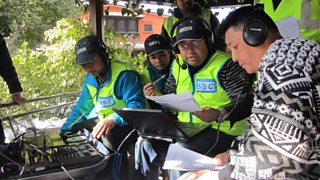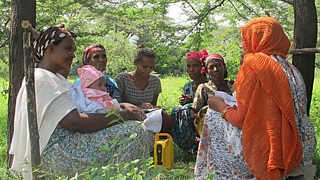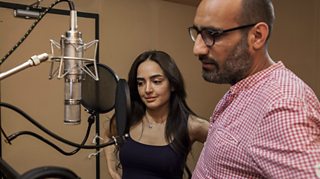Radio has never been more necessary
Caroline Nursey
Chief Executive Officer, Βι¶ΉΤΌΕΔ Media Action
On World Radio Day, Caroline Nursey, Βι¶ΉΤΌΕΔ Media Action’s Executive Director discusses the ongoing importance of radio in a fast-changing digital world.
As the digital media landscape develops at a revolutionary pace it is easy to forget that radio still reaches more places and more people in the world than any other medium – and that it has an enduring power to change people’s lives in profound ways.
It can provide urgent life-saving advice in the aftermath of a disaster, help communities divided by conflict rebuild trust in each other, and inspire people to hold those in power to account.
At Βι¶ΉΤΌΕΔ Media Action we understand radio’s potential to make a difference to people’s lives, and we harness it to provide vital information for, rather than about, people in some of the world’s poorest and most fragile societies.

Radio saves lives
Training for emergencies starts years in advance. Our shows journalists and editors how media can help their listeners and viewers during a humanitarian crisis with timely, relevant and practical information. Hundreds of journalists from Yemen, Afghanistan, Myanmar, , Tanzania and Lebanon have taken the course in the last year.
In emergencies information can be as important as food, water and shelter so within hours of the devastating earthquake that struck Nepal in 2015, Media Action was helping get life-saving information to people in need via radio programmes.
And now radio is a sheltering in camps after fleeing fierce fighting in Mosul.
It is not just in a humanitarian crisis that radio can help save and change lives.
Media Action is harnessing the power of local and national radio in Afghanistan to help end polio and combat other childhood diseases. (meaning ‘jewel’ in Pashto) is a weekly radio show featuring drama, special reports and interviews with health experts that brings vital information direct into people’s homes in a country where access to health advice is often unavailable.

In Ethiopia - Biiftuu Jiireenya (Dawning Light in Afan Oromo) and Jember (Dawning Light in Amharic) collectively reached over 21 million people last year. The shows have been particularly useful for the country’s army of volunteer health workers who have reported that Jember helps spark discussion and reinforces knowledge . “Of all the sources of information, the information we get from Jember is very important because they listen in a group, they discuss, share experiences, they can hear it later even if they miss it. Jember is the best source,” one health worker told us during research.
Shared experience through radio drama
In the UK we have all seen how drama can be a powerful tool for social change. Last year, the domestic violence storyline in The Archers not only enthralled audiences but also encouraged thousands of people to seek advice about domestic abuse.
The same is true overseas, even in the most divided societies.
Last September Media Action launched , a radio drama broadcast in Syria by Βι¶ΉΤΌΕΔ Arabic that follows the daily lives of the characters as they cope with the impact of prolonged civil war.
It is written by a team of Syrian writers who themselves have a variety of political points of view. Their characters and stories help listeners break the stereotypical view they might have about people of different beliefs on the other side of the conflict.
We show people’s humanity. And for Syria, as we’ve seen in other conflicts, greater understanding is the vital first step towards reconciliation and resolution.

Helping people hold power to account
Media Action knows that political participation is essential for stable and inclusive societies.
Thanks to its widespread availability and reach, radio is particularly effective in providing people who are marginalised, living in poverty or conflict become more engaged in politics and public life.
In a restricted media environment, our team in Myanmar launched a to ask questions of the newly elected government. In a country, where for much of the older generation, talking about democracy meant jail – such debates are vital in helping nurture an environment where people feel free to voice their opinions without fear.
Building capacity of local media is important to Media Action too. We believe that an independent and trusted media is central to any accountable and cohesive society.
Radio can appear old fashioned but it can reach young people effectively when combined with social media.
Over 60% of Zambians are below the age of 24, yet most of the decisions are made by elders. Supported by training and mentoring from Media Action, a weekly, interactive magazine radio show called aims to help young people participate effectively and bring about change and development in their society. Community listening groups provide feedback to ensure programme content remains relevant, and audiences can participate by calling the programme, or through Facebook, Twitter and WhatsApp.
For many people in the countries where we work radio is a reliable voice in a crisis, a source of life-saving health information and a platform to speak out when doors to public officials have been shut. Radio is almost 100 years old but has lost none of its ability to help save and transform lives across the world.
Βι¶ΉΤΌΕΔ Media Action is not funded by the Βι¶ΉΤΌΕΔ licence fee and depends on the generous support of donors. Please help .
Related links
Follow us on , and
